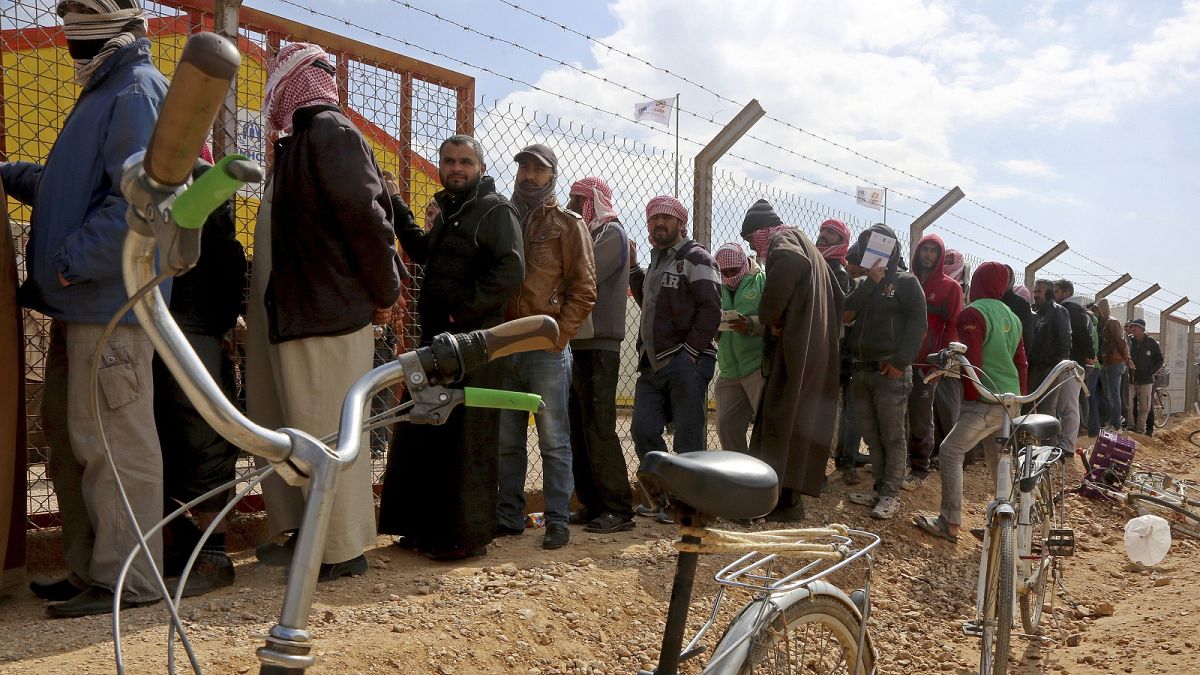Restrictions on the right to work and acquire assets hamper the ability for refugees to become self-reliant. The coronavirus pandemic has made a dire situation even worse in the absence of humanitarian aid or personal income.
How do you get by without a bank account? This is a question asked daily by millions of refugees worldwide who simply don’t have access to standard financial services. Even the digital and online services that many of us take for granted - tools that help us to save, transfer and receive money - are often out of reach for displaced people.
Before the pandemic struck, many refugees barely had enough money to get by - de facto restrictions on their rights to work, travel, and accumulate assets made it nearly impossible for them to become sustainably self-reliant. Alarmingly, a study by the UNHCR found that 90 per cent of refugees surveyed had less than $70 (€59) in savings.
However, the economic shock of COVID-19 has made this dire situation even worse. It has revealed how easy it is for refugees to slip through social safety nets. Our research has found that, in the absence of sufficient humanitarian aid, many have been forced to cut back on meals or sell their belongings. In Jordan, many lost their incomes overnight while, in Kenya, large numbers have been evicted from their homes.
In this time of crisis, access to financial services like money transfer services and humanitarian cash assistance could be a lifeline for refugees seeking to rebuild their livelihoods.
Last week, the International Rescue Committee (IRC) published a new report, building on findings from the Finance in Displacement (FIND) research project, a partnership with the Catholic University of Eichstätt-Ingolstadt (KU) and Tufts University, examining the policy context of financial services in Jordan, Kenya, Uganda, Ethiopia and Mexico. It finds that many refugees struggle to navigate the complex and often restrictive regulatory environment in order to access financial services.
Access barriers are highest for “standard” financial services, such as bank accounts. In Jordan, for example, refugees can’t open a bank account without a valid passport, which is simply inaccessible for many. In Uganda, requirements vary widely between banks. In other countries, such as Ethiopia, it’s technically possible by law to open a bank account with a refugee ID but, in reality, this policy hasn’t been fully implemented.
Refugees theoretically have some form of access to mobile money in each of the countries analysed. Unfortunately, in practice, it’s not so easy. In Kenya, the mainstream and highly popular mobile money service M-PESA is inaccessible for urban refugees and only available to some refugees in camps in a limited version. Other countries with more progressive policies, such as Jordan and Uganda, technically allow refugees to access the same services as hosts via their refugee IDs.
However, mobile money markets are relatively nascent and products are in such an early stage of development that they have very limited usages. It’s also far from a given that refugees can obtain the required refugee ID; in some contexts, this is extremely challenging, if not impossible.
A lack of internet access is also a problem. Refugees are 50 per less likely than the general population to have an internet-enabled phone, while 29 per cent of refugee households have no phone at all. There is a significant gender gap - women in low and middle-income countries are 23 per cent less likely to use mobile internet than men, and this gap widens even further in refugee contexts.
These issues haven’t escaped the notice of many governments, which are increasingly promoting digital financial services and encouraging providers to make them better, cheaper and accessible to all.
At the international level, finance ministers from G20 countries met on Friday and the G20 Summit between world leaders took place over the weekend. The G20’s action plan on COVID-19 specifically promotes digital financial inclusion to support economic recovery. And over the coming three years, this will also be a key priority of the G20’s work on financial inclusion. A cross-cutting focus of this work is ensuring that vulnerable groups - including refugees - have access to digital financial services. The critical steps to achieving inclusion are outlined in the Roadmap to the Financial Inclusion of Forcibly Displaced Persons - a multi-stakeholder alliance of partners that we support.
Notwithstanding these promising steps, digital services can only be a useful solution when markets are sufficiently developed and products are popular enough. Refugees also need equal access to current “mainstream” financial services, whether digital or standard.
We’re calling on governments to ensure refugees can access these mainstream services. This includes providing a clear regulatory framework for financial service providers that permits the use of alternative forms of government-issued refugee ID documents. It must also be quicker and easier for refugees to access this documentation.
Meanwhile, governments must continue to incentivise the expansion of digital financial services, such as mobile wallets. To enable refugee access, the number of mobile money agents must be increased and infrastructure improved around these - especially in rural areas and displacement camps.
Kenya, Uganda, Ethiopia, and Jordan have all signed on to global or regional policy commitments to promote the economic inclusion of refugees. Now they must live up to those commitments, and provide a blueprint for other countries seeking to improve refugees’ financial health.
- Daphne Jayasinghe is International Rescue Committee’s Head of Policy - Europe
_____________
Are you a recognised expert in your field? At Euronews, we believe all views matter. Contact us at view@euronews.com to send pitches or submissions and be part of the conversation.
